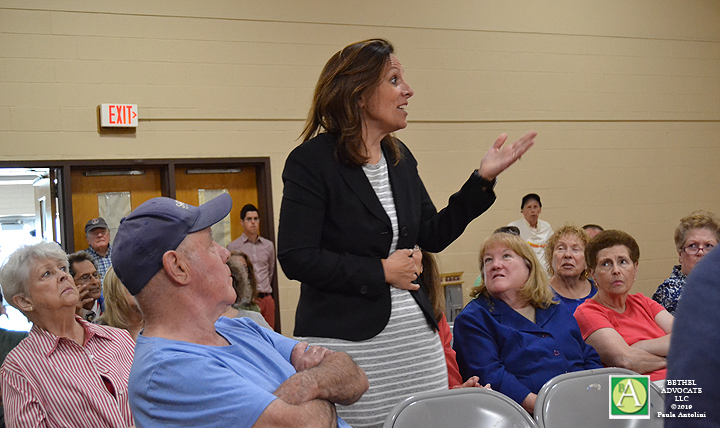
Report by Paula Antolini, June 6, 2020, 8:01AM EDT

(File photo @2019 Bethel Advocate / Paula Antolini)
Letter from Bethel Public Schools Superintendent, Dr. Christine Carver, to Parents/Guardians, Staff, and Community Members, June 5, 2020:
For once, I am at a loss for words. As Superintendent of Schools, part of my role is to help our students make sense of injustice and work with parents in supporting our students’ social emotional wellbeing. In addition to isolation related to the pandemic, our students are struggling to process the
recent national events. Many students have reached out to their teachers, our school counselors, social workers, administrators, and even me to process the emotions they are experiencing.
The death of George Floyd has provided yet another vivid example of the role of systemic racism and unconscious bias within our culture, which is extremely difficult for anyone, including our students, to understand. This incident evokes a myriad of emotions and is a reflection of how little our nation has moved in creating equity among all of its citizens. It saddens me that because we are not in session, it is difficult to engage our students in such an opportunity to process the events in a way that can produce positive outcomes, particularly in a virtual setting.
While we are deeply saddened by this incident, we know it represents a larger issue. This issue of systemic racism permeates many aspects of our culture including, but not limited to law enforcement, housing, employment, and even education. Until we engage in an honest dialogue about these issues, and work as a community to create change, we will continue to engage in this cycle of oppression.
buy Clomid online Buy Clomid no prescription cheap Clomid generic
I have stated in numerous previous communications, that while we are witnessing hate crimes and incidents of racial bias on a national level, we have been concerned about a growing number of incidents in acts of racial bias, hate speech and/or hate motivated incidents in our own school
community. During the last two years and until the pandemic, we were implementing multiple strategies to address these concerns and working toward ensuring our school system was not engaging in patterns which reinforce systemic racism. We have examined our discipline practices,
revised curriculum to reflect the backgrounds of all our learners, adapted our district policies to support an inclusive environment, brought in speakers and implemented activities to promote a culture of inclusion and civility. We know we can do more and will continue to work on ensuring that all of our students and families feel respected and included, regardless of their background.
I am hopeful and have a sense of optimism that we can address these issues as a community. We have educators, support staff, students, parents and community members who reflect on their practice and work to be inclusive and respect differences. We value our partnership with our local
police department who not only keep us safe, but also work as partners with the schools in developing that culture of inclusion. We need to continue to engage in a community conversation which recognizes the role of unconscious bias in our culture, reflect on ways our schools might be reinforcing systemic racism and work to empathize and understand others’ feelings and experiences so we can meaningfully invoke change. We will continue to engage in this work as we move forward because it is the right thing to do.
buy Cozaar online Buy Cozaar no prescription cheap Cozaar generic
In the meantime, there are a variety of resources that you might find useful in talking to children about hate and violence from the Anti-Defamation League (ADL). In addition, here are some other recommended resources from the Connecticut Center for School Change:
• This Saturday, June 6, at 10 a.m. ET, CNN and “Sesame Street” will host a 60-minute special: “Coming Together: Standing Up to Racism. A CNN/Sesame Street Town Hall for Kids and Families”. “The show will talk to kids about racism, the recent nationwide protests, embracing diversity and being more empathetic and understanding.”
• CNN has a piece for parents that is quite long but that provides info to parents (and teachers) about talking with children at different age levels. CNN: How to talk to your children about protests and racism. “As cities
and social media explode with anger over the killing of yet another black man at the hands of police, worried parents struggle with how to protect their children from seeing the worst of the violence while simultaneously
explaining the ravages of racism.”
• The Public Radio Program On Point from WBUR in Boston is hosting a program called How To Talk To Your Kids About Race, Racism And Police Violence. The website page about this program has additional useful
resources. (also useful for teachers)
• NPR (National Public Radio) has a story Talking Race with Young Children from April 2019.
We definitely do not have all of the answers, but recognize as a community, we can affect change. We want to continue to support your children in these unsettling times. If you need any type of support, please do not hesitate to reach out.
###
